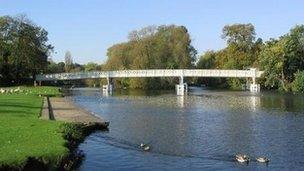The Whitchurch Bridge Company in VAT dispute
- Published

The current Grade II-listed metal structure was built in 1902
Owners of a bridge across the Thames claim they do not need to pay VAT on its reconstruction thanks to a 1792 Act of Parliament.
The private Grade II-listed Whitchurch toll bridge straddles Oxfordshire and Berkshire and needs to be restored at a cost of about £4m.
Owners have referred to the act which says the bridge should not be subject to any "rate, tax or duty whatsoever".
But the Treasury has argued at the High Court it should not be exempt.
Its lawyers say the VAT refund scheme is for bodies which are directly funded by state grants or whose costs are centrally-funded.
'Perpetual immunity'
The bridge was originally built by 10 local dignitaries using their own funds.
It was reconstructed in 1902 and now carries about 6,000 vehicles a day.
David Southern, from The Whitchurch Bridge Company, told the judge: "Under the 1792 Act, the bridge enjoys perpetual immunity from taxation.
"This immunity was granted specifically in recognition of the public function that the company was incorporated to perform."
If successful, the company will qualify for a £700,000 tax rebate.
But Treasury lawyers said if the company was exempt from all forms of taxation it would also include national insurance contributions and PAYE for employees, vehicle excise duty and other levies.
Mr Justice Burnett has now reserved his decision until a later date.
- Published11 January 2012
- Published17 November 2011